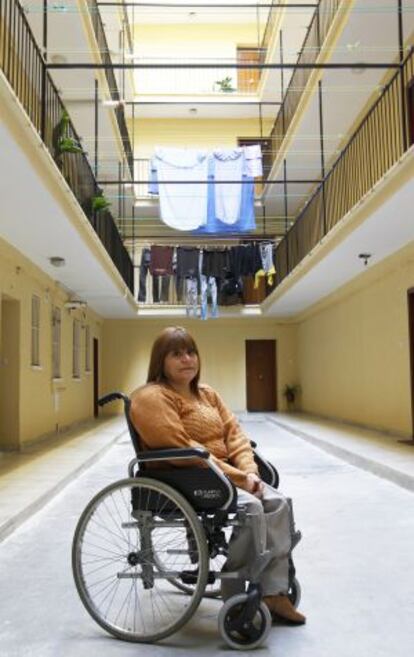Ecuador takes Spain’s mortgage law to European Court of Human Rights
Public defender calls on Strasbourg to alter Civil Procedure Law on evictions


Ecuador has presented a suit against Spain at the European Court of Human Rights over the Iberian nation's eviction legislation. Ramiro Rivadeneira, the Ecuadorian public defender, on Tuesday morning told a press conference in Madrid that Spain was "violating the right to justice" of Ecuadorian nationals resident in the country and called on Strasbourg to modify the Civil Procedure Law.
Ecuadorian authorities calculate that as many as 15,000 of its citizens in Spain are affected by either eviction processes or mortgage-payment problems.
Rivadeneira, who was accompanied by Ecuadorian Secretary of State for Migrants Lorena Escudero, brought to light the case of Luis Solórzano, an Ecuadorian construction worker who has lived in Spain since 1999. When he was laid off in 2008, he had difficulty meeting his mortgage payments. The bank through which he had contracted his mortgage, Lloyds, applied non-payment interest of 14 percent. "It was an official protection home, the maximum legal tax value of which is 54,143 euros," Rivadeneira said.
Solórzano contracted a mortgage for a total value of 173,000 euros, 325 percent higher than the house's value. The unemployed worker was refused the right to dation in payment on several occasions, condemning him to pay off his debt to the bank by handing over the keys to his home. After exhausting all legal avenues in Spain, and after appealing to the embassy, the public defender decided to take his case to the continental level. Rivadeneira hopes it will serve as a precedent and afford greater protection to Ecuadorian citizens. He added that the problem in Spain was the current Civil Procedure legislation, "which does not allow people to explain their situation in court while the carrying out [of an eviction order] is automatic."
The bank assured us that our mortgage would never rise above 900 euros"
As Rivadeneira announced the suit, Fidel Paladines shifted in his seat. He has spent "three months and two days" sleeping outside a Bankia office in Madrid to demand negotiation over the cases of 50 families facing eviction at the hands of the lender. The Ecuadorian embassy has assessed 6,000 of its nationals resident in Spain. This is what drew Paladines and his wife to the press conference. After the press had quizzed Rivadeneira, Paladines stood up to speak. "I'm very nervous," he said.
Also a construction worker and also unemployed, he and his wife bought their house in 2006 and started paying an 800-euro monthly mortgage, his wife, María Sarango, 52, explained. "At that time we had no trouble paying it. [The bank] assured us, although not in writing, that it would never rise above 900 euros, but we ended paying 1,400."
The couple has stopped paying the mortgage. The 426 euros that Paladines receives in benefits and the 250 euros Sarango makes cover the rental of a single room, in which she lives with their two student children, aged 10 and 20. He sleeps outside. They are also seeking the right to dation in payment.
The public defender thanked Paladines when he had finished. "Is that it?" the couple asked. Despite their disappointment at Rivadeneira's brusque response, the couple was happy with the Strasbourg development.
Tu suscripción se está usando en otro dispositivo
¿Quieres añadir otro usuario a tu suscripción?
Si continúas leyendo en este dispositivo, no se podrá leer en el otro.
FlechaTu suscripción se está usando en otro dispositivo y solo puedes acceder a EL PAÍS desde un dispositivo a la vez.
Si quieres compartir tu cuenta, cambia tu suscripción a la modalidad Premium, así podrás añadir otro usuario. Cada uno accederá con su propia cuenta de email, lo que os permitirá personalizar vuestra experiencia en EL PAÍS.
¿Tienes una suscripción de empresa? Accede aquí para contratar más cuentas.
En el caso de no saber quién está usando tu cuenta, te recomendamos cambiar tu contraseña aquí.
Si decides continuar compartiendo tu cuenta, este mensaje se mostrará en tu dispositivo y en el de la otra persona que está usando tu cuenta de forma indefinida, afectando a tu experiencia de lectura. Puedes consultar aquí los términos y condiciones de la suscripción digital.








































